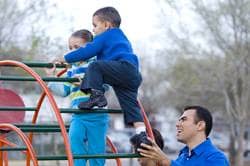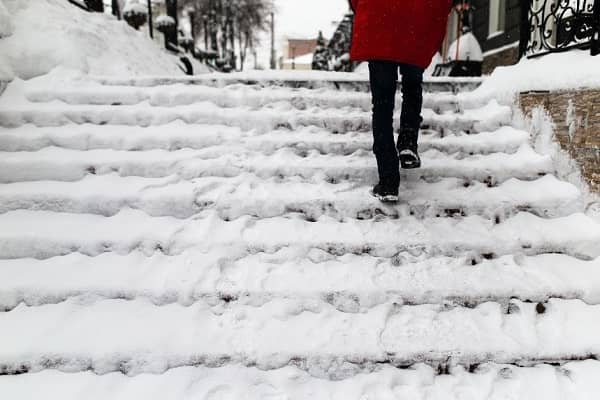Keeping kids safe on winter playgrounds
 Winter weather can trigger additional hazards on playgrounds. Snow and freezing conditions create a need for more vigilant inspections of protective groundcovers and equipment, and closer supervision of children.
Winter weather can trigger additional hazards on playgrounds. Snow and freezing conditions create a need for more vigilant inspections of protective groundcovers and equipment, and closer supervision of children.Protective groundcovers are tested in freezing conditions but take place in controlled laboratory environments that simulate surfaces with optimal drainage. Loose-fill materials such as wood chips, wood fibers, and sand and pea gravel can freeze into a hard surface if they do not have adequate drainage. If your protective groundcover shows a history of freezing into a hard surface, consider having a landscaping professional inspect your playground’s drainage system. Rubberized mulch is not prone to freezing because it does not absorb water. Regardless of its depth, snow is not a recommended protective groundcover. Remove it around elevated play structures as soon as practicable.

Inspect children’s clothing before allowing them to play outdoors. Drawstrings for hoods and scarves can become entangled in playground equipment creating a possible strangulation hazard. Drawstrings and scarves should be removed and a note sent home to parents explaining why.
Do not allow children to throw or eat snow. Running in snow can increase the likelihood of a slip and fall, so discourage it as best you can. If you are planning outdoor activities in the snow, get permission from parents and don’t forget the sunscreen.
Hot Winter Tip!
Save a pipe and spare a headache—keep the heat on when your facility is unoccupied and temperatures fall below freezing.

This "document” is intended for general information purposes and should not be construed as advice or opinions on any specific facts or circumstances. The content of this document is made available on an “as is” basis, without warranty of any kind. This document cannot be assumed to contain every acceptable safety and compliance procedure or that additional procedures might not be appropriate under the circumstances. Markel does not guarantee that this information is or can be relied on for compliance with any law or regulation, assurance against preventable losses, or freedom from legal liability. This publication is not intended to be legal, underwriting, or any other type of professional or technical advice. Persons requiring advice should consult an independent adviser or trained professional. Markel does not guarantee any particular outcome and makes no commitment to update any information herein, or remove any items that are no longer accurate or complete. Furthermore, Markel does not assume any liability to any person or organization for loss or damage caused by or resulting from any reliance placed on this content.
Markel® is a registered trademark of Markel Group Inc.
© 2023 Markel Service, Incorporated. All rights reserved.
Tags
